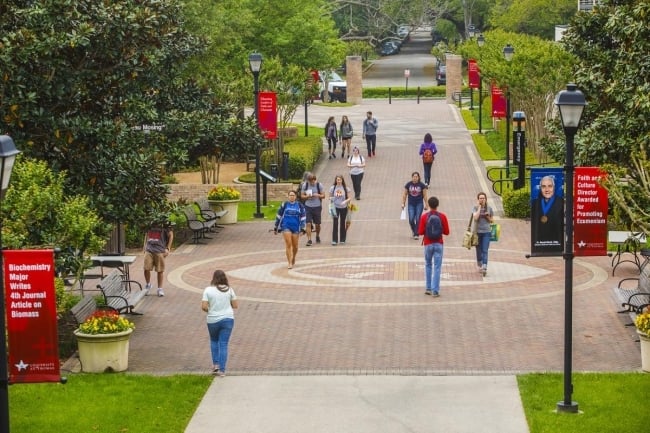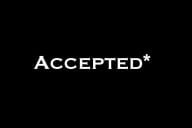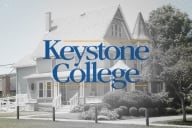You have /5 articles left.
Sign up for a free account or log in.

The majority of respondents favor policies that promote increased transparency and accountability for institutions of higher education.
Gonzo 247 / University of St. Thomas Houston
Even as the public’s loss of faith in higher education dominates headlines amid campus protests, the rising cost of attendance, growing anti-DEI sentiment and more, it seems that most Americans still see value in a college degree. According to a survey of 1,500 U.S. voters conducted by Global Strategy Group and GS Strategy Group for Third Way, 80 percent of respondents still believe higher education has value, including 88 percent of Democrats and 75 percent of Republicans.
The finding is a departure from recent reports about declining confidence in higher education, including a Gallup survey published in 2023 that showed that the percentage of Americans who felt highly confident in higher education had dipped significantly from previous years to a “historic low.” It also sharply contrasts the public attitudes of many Republican politicians, who, in recent months, have antagonized higher education leaders in Congressional hearings and in the press.
But Sophie Nguyen, a senior policy analyst at the left-leaning think tank New America, where she focuses on public opinion of higher education, noted that believing college degrees have value and having confidence in the institution of higher education are two separate—if related—ideas. In fact, Third Way’s report shows only 56 percent of American voters have a favorable view of “the higher education system in the United States” as a whole; by comparison, 77 percent hold a favorable view of trade schools, 75 percent hold a favorable view of community colleges and 65 percent hold a favorable view of four-year institutions, while 37 percent hold a favorable view of for-profit colleges.
“I’m not saying these numbers refute the numbers from Gallup; I think they show different sides of the story in Americans’ perspective in higher education,” she said. “Even though there are things they are not happy with in higher education, a high percentage still think the college degree is valuable or they still believe in the value a college degree can bring to them or to society. That’s a narrative we don’t often hear.”
The survey also sought to evaluate what people see as the primary way higher education provides value: by setting students up for successful careers or creating informed citizens? When asked to choose which outcome aligns most closely with their own beliefs, a slight majority of respondents, 57 percent, chose career outcomes—though, on a different question, 49 percent of respondents said they believed the true value of college was a combination of those two options. The gap between the number of Democrats (53 percent) and Republicans (63 percent) who chose career outcomes was 10 percentage points.
Return on Investment
While many Americans still consider higher education valuable, Ben Cecil, a senior education policy advisor at Third Way, said that he sees the current moment as an inflection point, where universities, policymakers and advocates must make changes to retain that perception—or risk losing it.
Respondents expressed concern about the cost of college, with four out of five voters noting that higher education’s price tag is on the rise. They also said they want institutions to be held accountable for students’ outcomes; 70 percent of respondents, for example, said they believe programs should be required to demonstrate that their graduates can pay back their student loans in order to receive federal financial aid.
Voters “want to know upfront from a transparency angle what they’re investing in—and accountability for when that’s not happening,” Cecil said.
Jodie Adams Kirshner, a research professor at New York University studying the barriers low-income and minority students face in accessing higher education, said she supports the idea of increased transparency, but stressed that such data must be presented in a way that students can easily parse to help them decide where and what they want to study.
“It makes sense to want … more data on outcomes. I think the tricky thing is that the American higher ed system is already so complicated and so there’s a lot of information that is hard to navigate, even when it comes to what the ultimate price is,” she said.
Proponents of postsecondary education may face a timeline in making their case. Though today’s voters see value in higher education, the majority of survey respondents—65 percent—predicted that in the next decade, high schoolers are going to be less interested in pursuing higher education.
“That, to me, is an alarm bell for anyone who is an institutional leader or higher education advocate,” Cecil said.
Kirshner said that moving forward, she would like to learn more about how the survey respondents defined certain terms—such as “value” and “return on investment” (ROI). For example, do they believe colleges produce a good ROI five years past graduation, or over a course of a lifetime?
She said such a distinction can be a major consideration for low-income families, who often don’t have the financial flexibility to invest in something that will have a major payoff in a decade, regardless of how good that payoff is.
“It’s so compelling for people who have immediate, urgent needs [to get] a job that for an 18-year-old looks like it’s paying well—something like 17 dollars an hour at a warehouse—but over time, that’s not going to be very much,” she said.



